Call automation: Where and how your contact center can benefit

Senior Content Marketing Manager

Tags
Share
Contact centers handle hundreds and even thousands of customer conversations on a daily basis, and agents have to manage a wide variety of tasks for each call. From logging information to executing compliance-related tasks to, of course, talking to the customer, there’s a lot on their plates.
This goes for managers and coaches too, who have to review call recordings and transcripts, do quality assurance, and pinpoint coaching and training opportunities for agents. Because of this, call automation has emerged as a powerful tool to streamline operations, improve the customer experience, and uplevel overall call center performance.
In this blog, we’ll dig into what call automation entails, its benefits, and actionable tips for how to automate the call process in a contact center.
What is call automation?
Call automation refers to the use of technology to reduce manual work by automating various aspects of inbound and outbound calling processes. It’s sometimes also called call center automation because it’s typically used in contact centers and contact centers, and involves deploying software and systems that can handle repetitive tasks such as call routing, message delivery, appointment scheduling, and even basic customer support questions.
Where can you benefit from call center automation?
You can automate many different aspects of a call or contact center’s operations. Here are just a few of them:
Automated call routing
Automated call routing uses algorithms to direct incoming calls to the most appropriate agent or department based on predefined criteria such as caller information, issue type, or agent availability.
This technology ensures that customers are quickly connected to the right person who can address their needs, which minimizes wait times and improves overall efficiency. This is an important process to automate in a call center because it solves an important pain point for customers who contact your call center: the frustration of being transferred back and forth between agents multiple times.
On top of that, this also optimizes agent productivity by ensuring they’re receiving the calls that align with their expertise and skills, leading to quicker resolutions and higher customer satisfaction.
Self-service automation
Self-service automation empowers customers to resolve common inquiries or perform transactions without having to talk to an agent, typically through interactive voice response (IVR) systems or chatbots.
This type of automation allows customers to handle routine tasks like checking account balances, updating information, and troubleshooting basic issues without burdening agents, which means call centers can significantly reduce call volumes and wait times.
What’s nice about this approach is it not only provides customers with instant access to information, but also allows agents to focus on more complex queries that actually require human intervention. Self-service automations can also operate 24/7, ensuring round-the-clock availability and improving operational efficiency without increasing staffing costs.
Call scheduling and other sales automations
It’s also possible to automate call scheduling and sales tasks such as appointment booking, lead management, and follow-up activities. By automating these workflows, call centers can ensure more timely callbacks, schedule meetings based on agent availability and customer preferences, and even nurture leads through automated reminders and notifications.
Sales automations are essential because they’re an easy way to incrementally accelerate the sales cycle and also improves conversion rates by maintaining consistent engagement with prospects.
Training and coaching automation
Some of the most time- and energy-intensive tasks in a contact center involve training and coaching. Managers used to have to review customer interactions manually, spend time figuring out agents’ strengths and weaknesses, and then meet with them individually to talk them through ways to improve. Coaching just one agent can easily take over an hour every week. Multiply that by a team of 10 agents, and that time can stack up fast.
Automation is a huge force multiplier here because the technology allows you to deliver personalized coaching and performance feedback to agents.
For example, Dialpad Support empowers managers to provide real-time coaching during customer interactions by analyzing conversations in real time. The live sentiment analysis feature shows managers at a glance if any calls with customers are in negative sentiment territory:
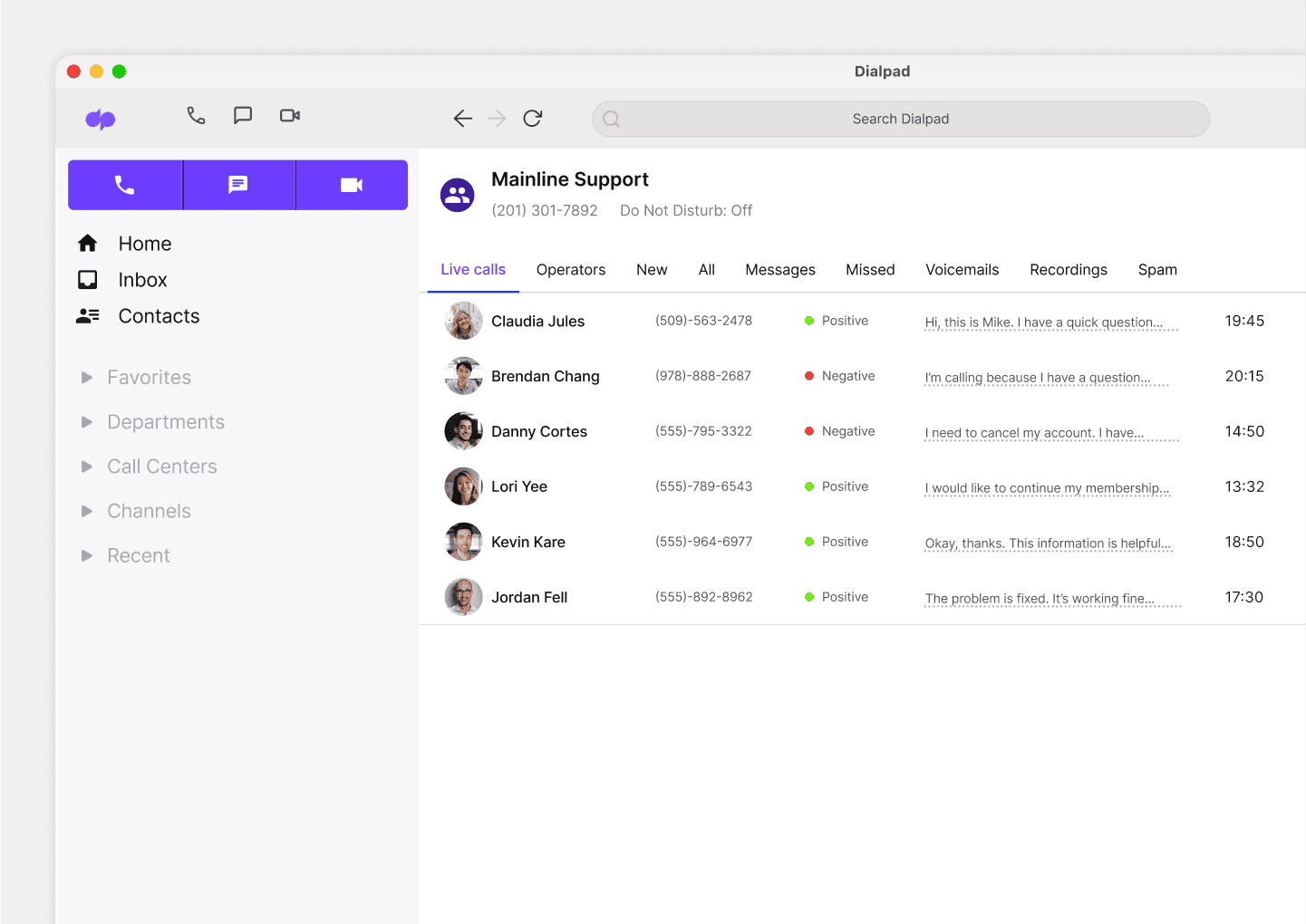
Even if a supervisor or coach is overseeing multiple agents and simultaneous calls, it’s easy for them to see where they may be needed and if they need to jump in.
You can even automate on-the-call coaching with AI. We use Dialpad’s Ai Agent Assist feature, which can instantly search all of your company’s connected knowledge sources (like training materials, PDFs, and so on) and pulls up the right information for agents when it detects certain keywords being spoken on the call:
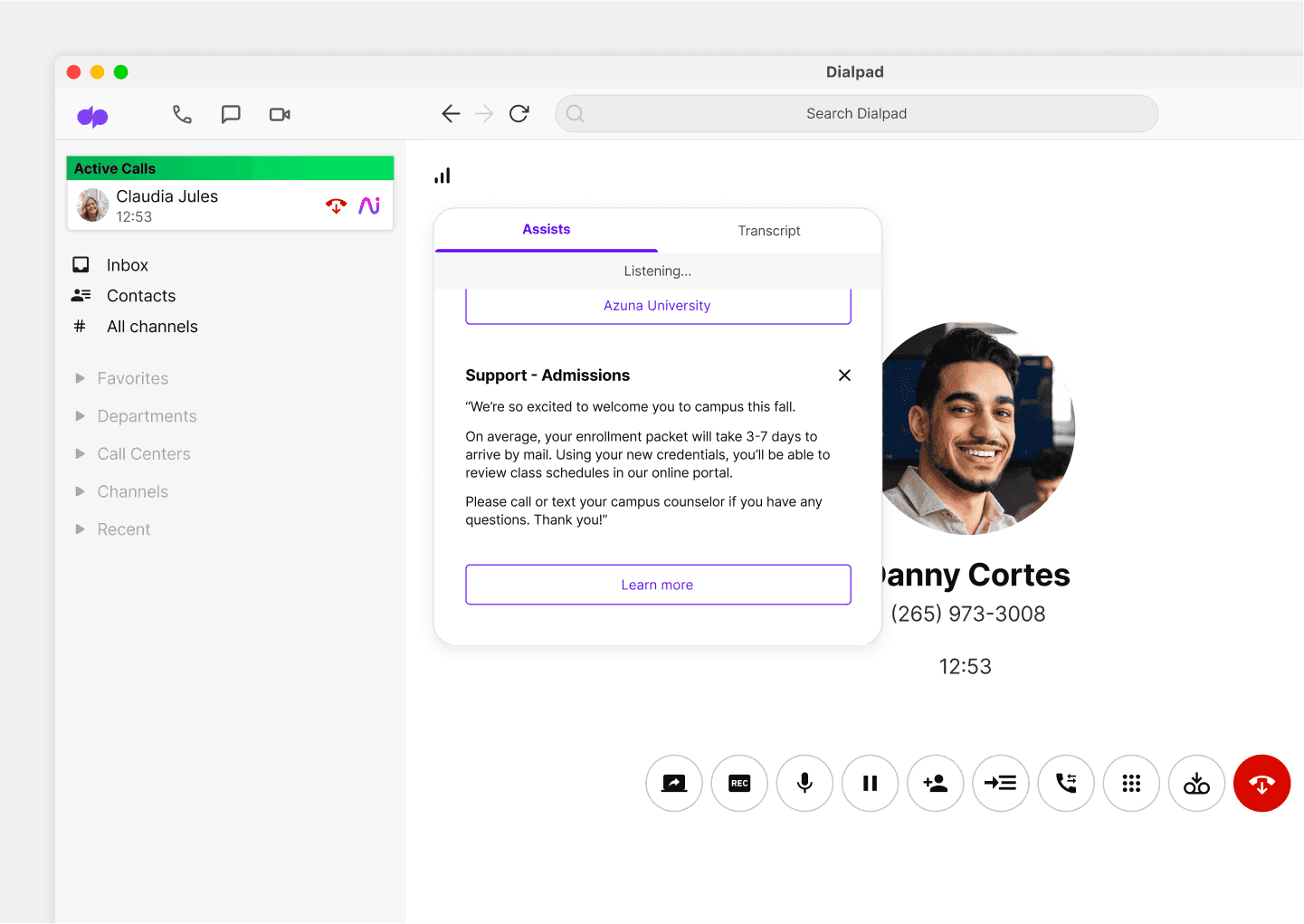
These automations are incredibly useful because they ensure continuous skill development and adherence to best practices, while improving agent competence and confidence at the same time.
Post-call automation
Post-call automation involves automating “after-call work” or tasks that occur after a customer interaction, such as sending follow-up surveys, updating CRM systems with call details, and initiating workflows for issue resolution or escalation.
Whereas the training and coaching automations we talked about earlier are mainly helpful for managers, post-call automations are especially important for agent performance as they ensure prompt and accurate handling of customer feedback and improve data accuracy in CRM systems. For busy agents who have to keep track of a laundry list of tasks, this can significantly reduce the chances of human error.
Dialpad Ai, for example, can transcribe calls in real time, which means it can also log call notes and generate call summaries for agents:
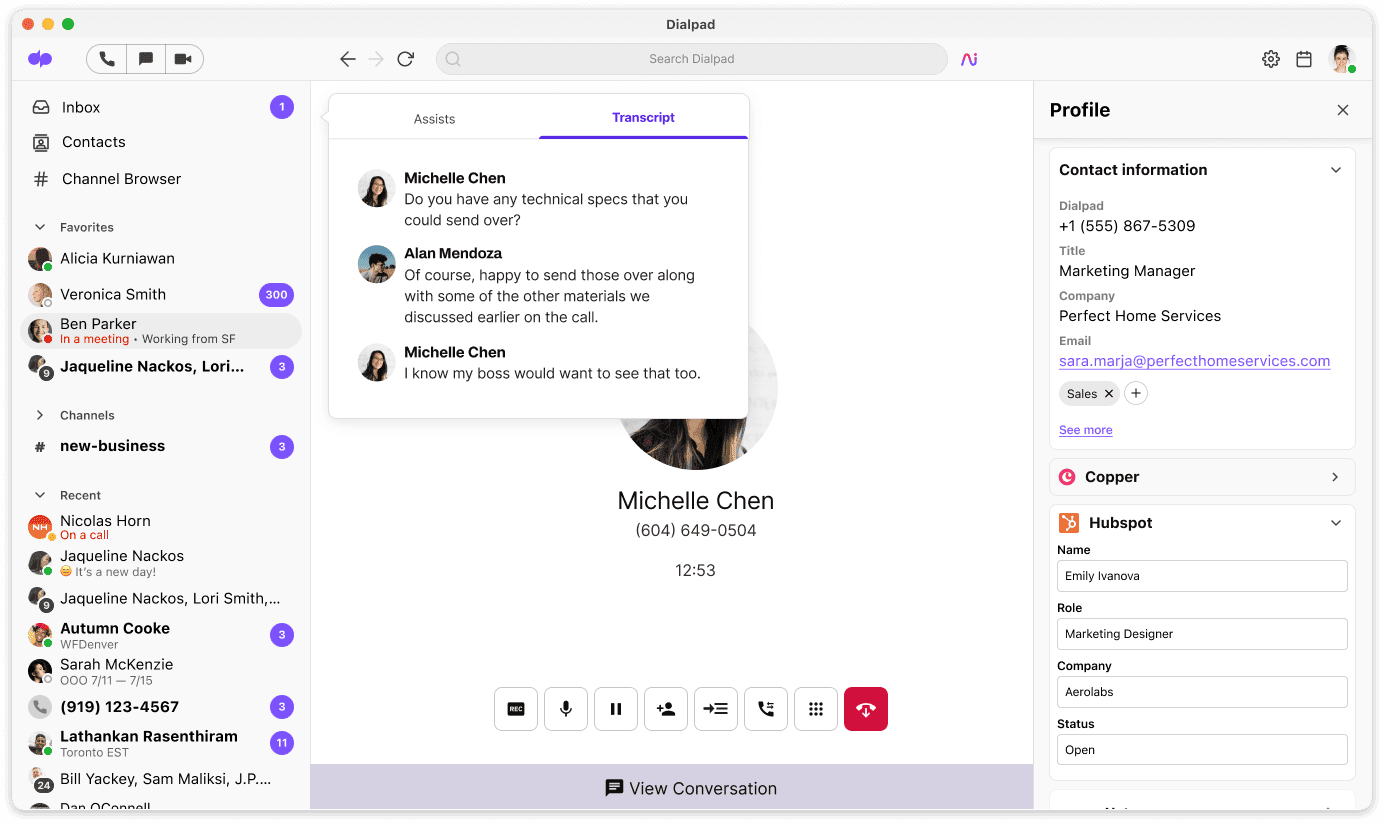
And because Dialpad integrates with many CRMs like Salesforce and HubSpot, it can also automatically update these CRMs with records of calls and texts:
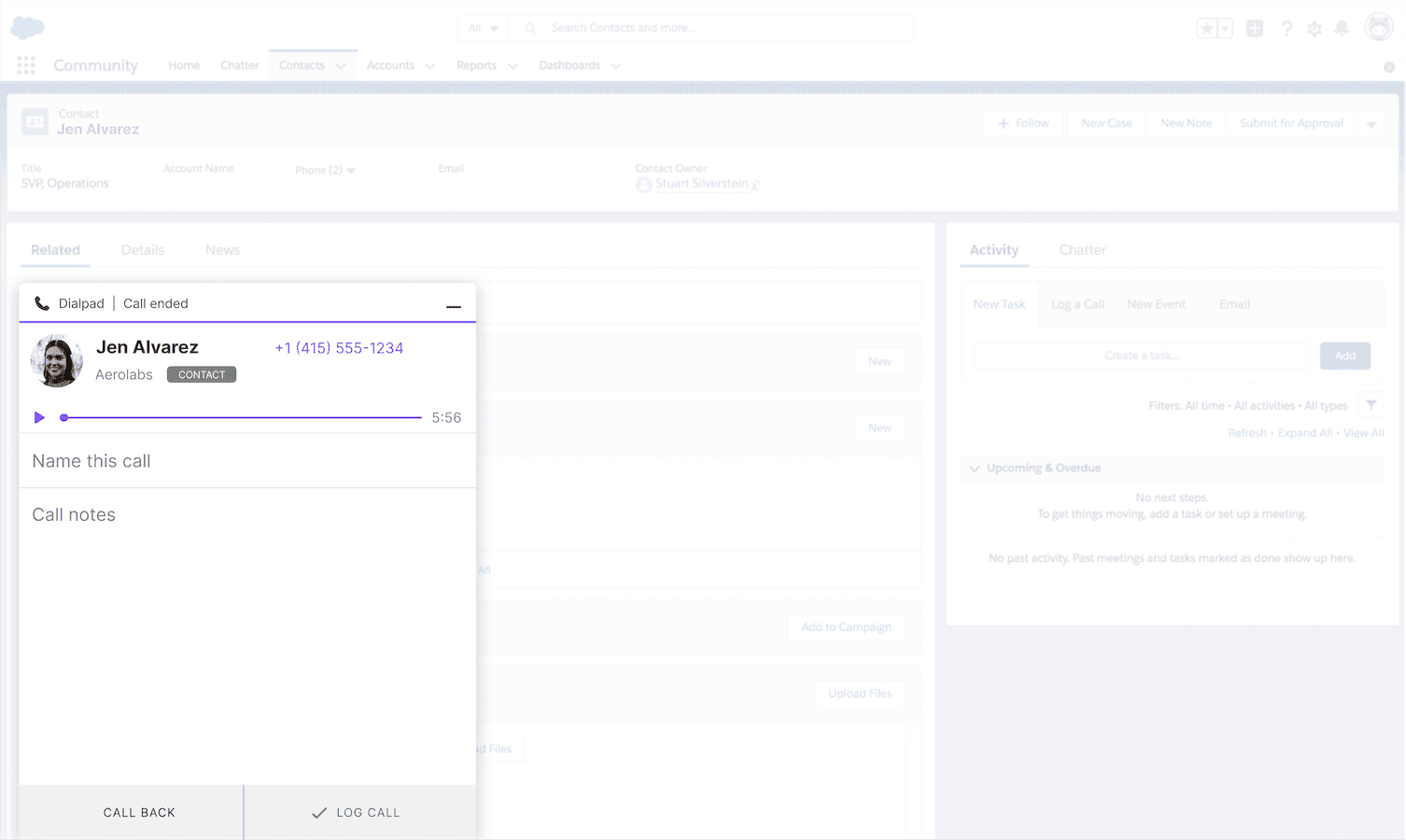
Analytics and forecasting
Call automations can also help with analytics and forecasting by leveraging advanced algorithms and machine learning to analyze call data, identify trends, and predict future call volumes and customer behavior.
If your contact center struggles with manually gathering data, this is huge. Say your business runs CSAT surveys to measure customer satisfaction, but has always struggled with low response rates and polarized responses because only the happiest and angriest customers tend to bother responding—a very common challenge for companies of all sizes in every industry.
Dialpad’s Ai CSAT feature can infer customer satisfaction scores for up to 100% of customer calls thanks to its hyper-accurate transcription feature. That means you don’t have to manually send out surveys to customers and hope that enough of them bother to respond. What results is a more representative sample size for your CSAT scores, and a more accurate perspective of how satisfied your customers truly are:

This is just one example of how automated call center solutions and AI can support a data-driven approach to enable call centers to make more informed decisions, optimize resource allocation, and proactively address operational challenges.
How can you benefit from call automation?
Call automations benefit contact centers in far-reaching ways beyond just “it saves time and money”:
Higher customer satisfaction
With automations, agents don’t have to worry as much about forgetting to do one of the 12 tasks on their list, and managers don’t have to speed through QA reviews because they’re short on time.
Strategically implemented automations in contact centers can ensure more consistent service delivery, less human error, and more time available to dig into the details of agent and team performance. Ultimately, this means happier customers because they don’t have to wait as long for a resolution, and happier agents and coaches because they’re not as bogged down with so many manual tasks.
Higher adherence to compliance and security requirements
Automation is also extremely important when it comes to adherence to regulatory requirements. From HIPAA regulations to Medicare sales call regulations, any contact center with compliance requirements stands to benefit from standardized processes and features like automated call recordings.
Dialpad’s Ai Scorecards, for example, automatically compare what is required to be said during the call against what is actually said—without managers having to listen to every single call recording to see if agents are being compliant:
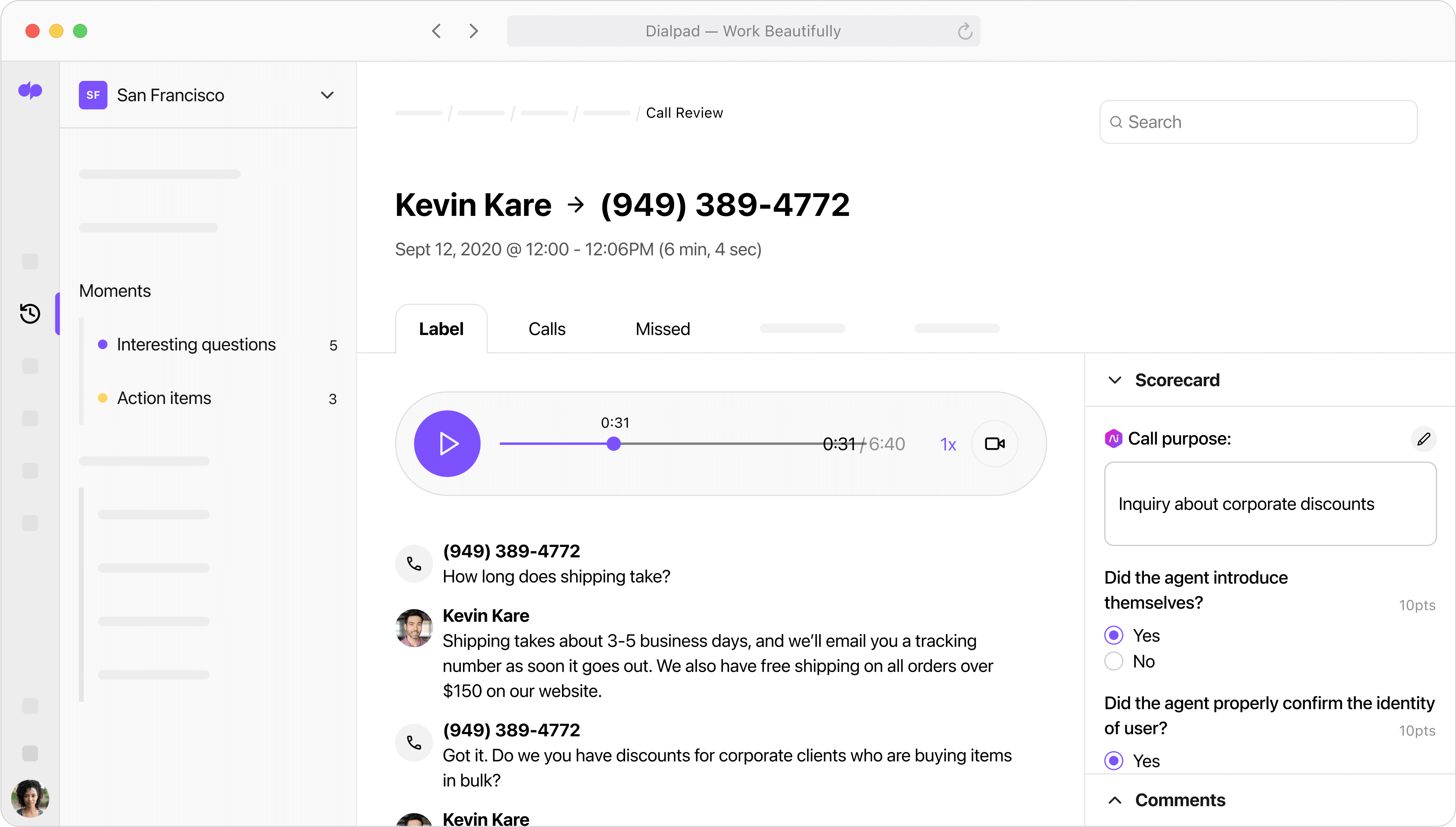
Improved first call resolution and other KPIs
What all of these efficiencies and improvements mean in the end is tied directly to performance. If you’re tracking call center KPIs like first response time, hold times, and CSAT scores, then using automations to support overloaded agents, develop more targeted training, and uncover more real-time insights should be a top priority.
Cost savings
Finally, automating repetitive tasks also reduces operational costs including staffing, training, and secondary effects like lower customer churn and higher retention. With lower wait and hold times, and more avenues for customers to self-service, it should get easier and easier for contact centers to handle higher call volumes in a cost-efficient way..
Harness the power of call automation with the help of Dialpad Ai
Call automation represents a pivotal shift for contact centers. From optimizing operational efficiency, to providing a better customer experience, it’s crucial for any customer-facing team that wants to achieve substantial cost savings while keeping customers happy.
By leveraging advanced AI technology like Dialpad Support to automate mundane tasks, you can elevate your service delivery, foster customer loyalty, and gain a competitive edge.
Get a firsthand look at how it works by booking a product tour!
Want to see how Dialpad Support can work for your team of supervisors and agents?
Book a product demo to learn about how you can use RTA cards, Custom Moments, and more. Or, take a self-guided interactive tour of the app!








